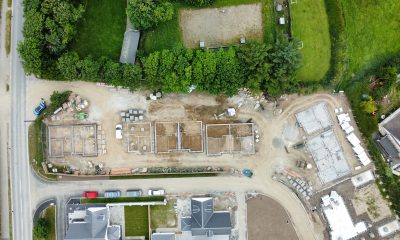Climate
Hydrogen fuelled local bus in green public transport trial
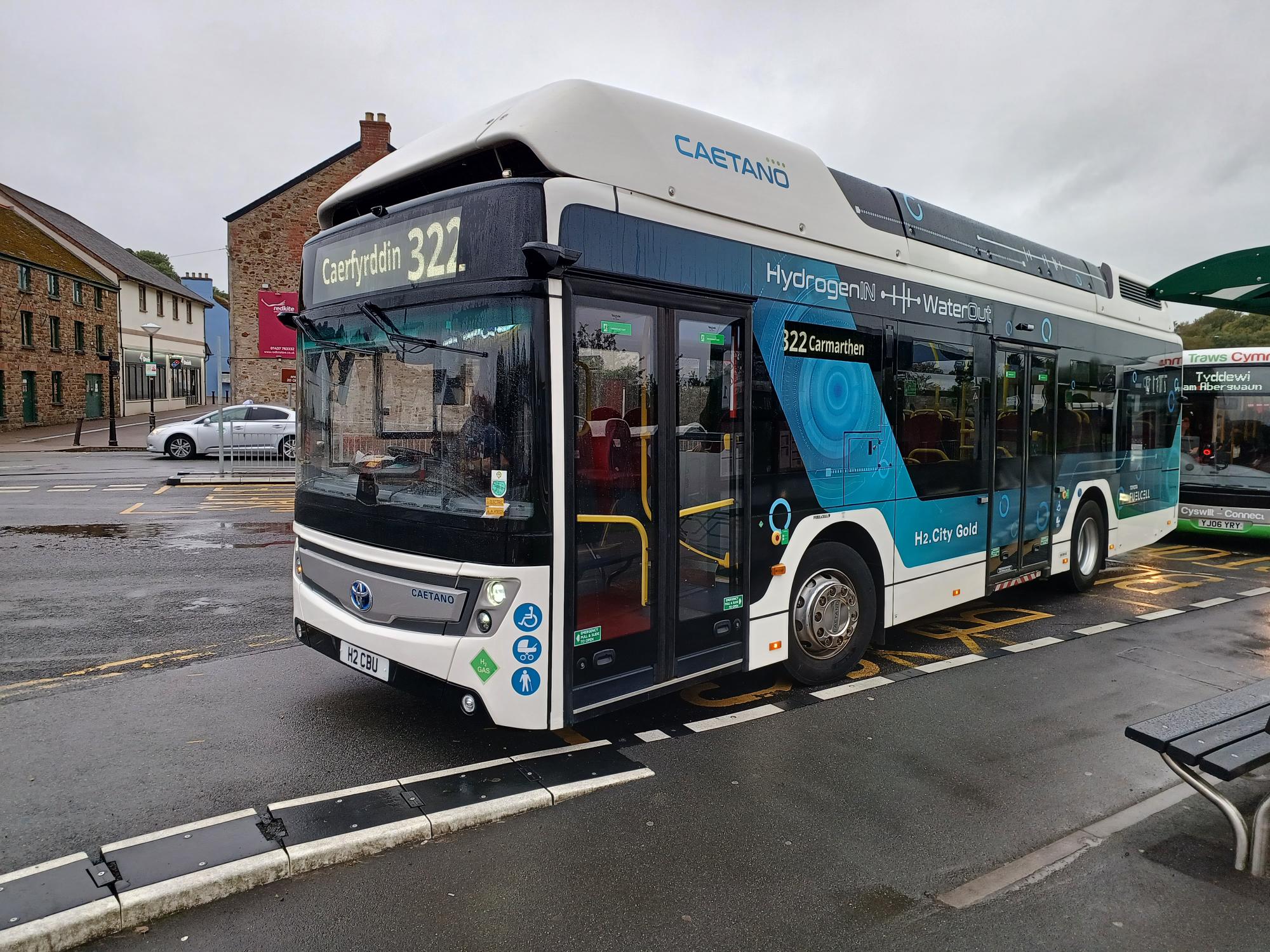
AN FUTURISTIC demonstration of green, zero-emission public transport is underway in west Wales using a hydrogen fuelled bus between Haverfordwest and Carmarthen.
The trial on the 322 bus route began on Tuesday 26th September and runs on selected days until Monday 9th October 2023.
The bus is being operated with the support of Pembrokeshire and Carmarthenshire County Councils, bus operator Taf Valley Coaches and private hire operator Hyppo Hydrogen Solutions.
The bus is fuelled by locally produced electrolytic green hydrogen – made from renewable electricity and water – supplied by Protium from their installation at the University of South Wales Hydrogen Centre in Baglan.
The H2 City Gold electric bus is provided by Caetano Bus UK with the HyQube hydrogen refueller provided by Fuel Cell Systems Ltd.
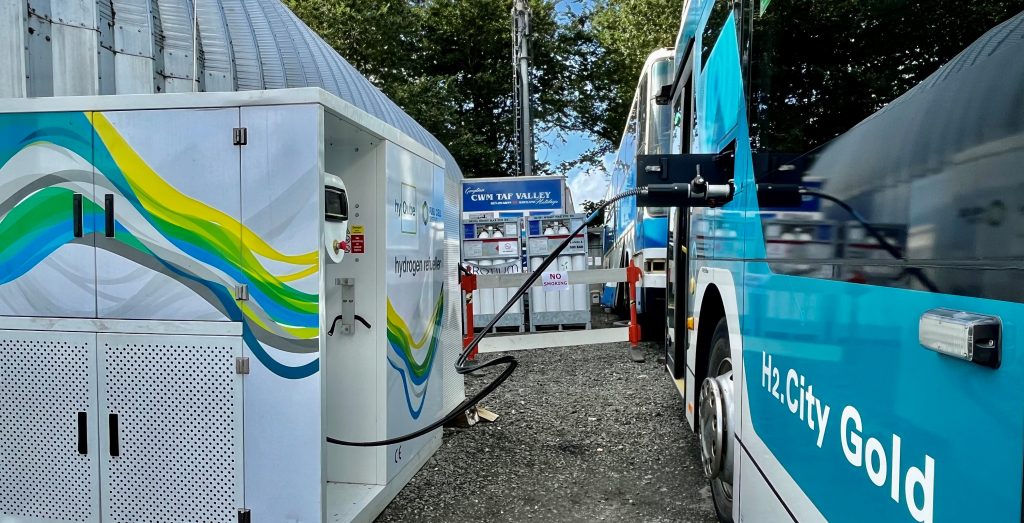
The bus has an equivalent range to that of a conventional diesel vehicle and takes a similar time to refuel. It uses a refuelling point similar to the garage forecourt that we are all familiar with.
The 322 service was chosen to see how the bus performs on a longer route with long hills, which can be a challenge for battery powered buses.
Cllr Paul Miller, PCC Cabinet Member for Place, the Region and Climate Change, said: “Following our successful trial of hydrogen fuel cell cars in the Milford Haven : Energy Kingdom (MH:EK) project we know that decarbonising public transport is key to achieving our individual and collective commitments for net zero carbon.
“We are pleased to host this trial. Hydrogen can play a significant role in decarbonising public transport and the only emissions from this vehicle is water vapour”.
Pembrokeshire County Council’s Head of Infrastructure & Environment, Darren Thomas added: “The use of hydrogen is very much part of the council’s decarbonisation and renewable energy strategy.
“Given the major renewable energy and hydrogen projects that are underway in the region, hydrogen fuelled buses offer a practical solution for communities to decarbonise public transport and immediately improve air quality. These trials are great news as they could lead the way for cleaner public transport.”
Bus and coach operator Taf Valley Coaches, a family-owned and operated business based in Whitland, is trialling sustainable fuels and technologies to help decarbonise their operations.
As part of the Caetano bus trials, they will be getting feedback from the vehicle, the drivers and also the passengers to help inform future provision.
Chris Foxall, Founder and CEO of Hyppo Hydrogen which is delivering hydrogen related services in Wales and has established the first private hire operator that runs fuel cell passenger cars, said: “The fuel cell is a Welsh invention and with the vast potential for additional renewables in counties like Pembrokeshire, it makes sense to produce and use hydrogen locally.
“There is already significant experience dealing with hydrogen safely in the region, and so I’m pleased that the council is supporting the roll out of hydrogen transport for the benefit of the community.”
Meanwhile, the Senedd will today (Oct 4) debate a motion calling on the Welsh Government to protect and invest in bus services.
Jane Dodds MS has accused Labour Ministers of stringing bus services along and being too slow to act on its long-awaited reform of bus services. In the debate, Jane will highlight the huge benefit that public transport has to local economies, with 63% of small and medium-sized businesses stating that their business is directly affected by public transport.
Commenting, Jane Dodds MS said: “For months, Welsh Government have strung communities and bus operators along with last-minute and short-term announcements around the funding of bus services. What’s more, the long-awaited reforms to bus services still look no closer to being delivered.
“Over recent weeks and months, vital services like the Fflecsi Bwcabus in rural areas has been axed, and more than 10% of bus services have seen major revisions, with huge ramifications for our communities.
“Meanwhile the Conservatives in Westminster are toying with the idea of scrapping the Manchester leg of HS2 means that new services will come nowhere near Wales. Any notion of HS2 being of any benefit to Wales is an absolute joke.
“The Conservatives are running out of excuses to withhold £5bn in infrastructure spending for Wales and, by sitting on their hands, Labour Ministers are watching bus services fail. We deserve better.
“Communities and bus operators need urgent clarity about Welsh Government plans and a crystal clear timeline to deliver the changes and improvements we all want to see in our bus services.”
Climate
Pembrokeshire announced as new location for Atlantic rainforest restoration

THE WILDLIFE Trust of South and West Wales (WTSWW) will begin restoring lost Atlantic rainforest in Pembrokeshire thanks to a long-term partnership with Aviva.
Today, Monday 15th July, WTSWW reveals plans to improve habitats and recreate temperate rainforest at Trellwyn Fach near the Pembrokeshire coast. Rainforests used to cover much of the west coast of Britain though were destroyed over hundreds of years and today, only fragments remain.
Rainforest restoration forms part of a wider programme of nature-based projects to remove carbon from the atmosphere and help nature recover, funded by Aviva’s donation. Communities in Pembrokeshire will be closely involved in the project, with plans for volunteering, educational and employment opportunities, as well as improved access to nature.
The project at Trellwyn Fach is part The Wildlife Trusts’ Atlantic rainforest recovery programme, which is supported by a £38 million donation from Aviva.
The Aviva donation supports the programme to restore temperate rainforests in areas where they used to grow along the damper, western climes of the British Isles. Other rainforest restoration projects have been announced in Devon, North Wales and the Isle of Man.
Sarah Kessell, Chief Executive at WTSWW said told The Pembrokeshire Herald: “We’re delighted this rainforest restoration project at Trellwyn Fach can get started. This site is ideally situated in the Gwaun valley, already connected to Celtic rainforest remnants and giving us the opportunity to buffer and extend this amazing habitat as well as improving access for the local community. These are exciting times!”
Leah Ramoutar, Director of Environmental Sustainability, Aviva, added: “We’re proud to see the Wildlife Trust add another site to the rainforest restoration project, helping Wales become more climate ready. The site in Trellwyn Fach will connect with existing examples of this precious habitat, reestablishing natural corridors to benefit wildlife and add more natural beauty to this stunning part of Wales. It will also provide flood resilience to nearby homes and businesses as well as green jobs and volunteering opportunities to the local community.”
Trellwyn Fach is 146 acres, next to the village of Llanychaer, and just 2 miles from Fishguard. The southern tip of the site connects with the Gwaun Valley woodland, itself a remnant Celtic rainforest. The north end runs onto open moorland on Dinas mountain. From the top of the site there are views of the Preseli Mountains. There is little diversity on the majority of the land with nearly all fields being of semi-improved rye grassland that were grazed by sheep, but there are some wetter areas and some lovely, mature hedgerows of blackthorn, hawthorn, hazel, oak, gorse and holly. Overall, the potential to improve habitats for wildlife is high.
WTSWW’s plans to improve the wildlife value of the new nature reserve through low-intensity grazing of some areas, working with local graziers. The Trust’s conservation team will monitor changes in biodiversity through habitat and species surveys including breeding bird surveys and butterfly transects.
Around two-thirds of the site will become broadleaved woodland through planting and natural regeneration, to buffer the existing woodland and to support the wider connectivity of remnant Celtic rainforest in the landscape. This woodland corridor leads in an arc through the Gwaun Valley, to Pengelli Forest (a WTSWW nature reserve) and the latest plans will contribute greatly to increasing the area of temperate rainforest in north Pembrokeshire. This complements recent work undertaken by Cwm Arian’s ‘Growing Better Connections’ project which engaged with private landowners in the same area to plant up land and/or hedgerows to link woodland habitats in north Pembrokeshire.
A bridleway runs across the bottom part of the site and there is scope to connect walking trails up to Dinas mountain to improve pedestrian access from Llanychaer. There are excellent opportunities to involve local communities in the development and monitoring of this new nature reserve.
Climate
Solar power partnership lighting up community energy fortnight
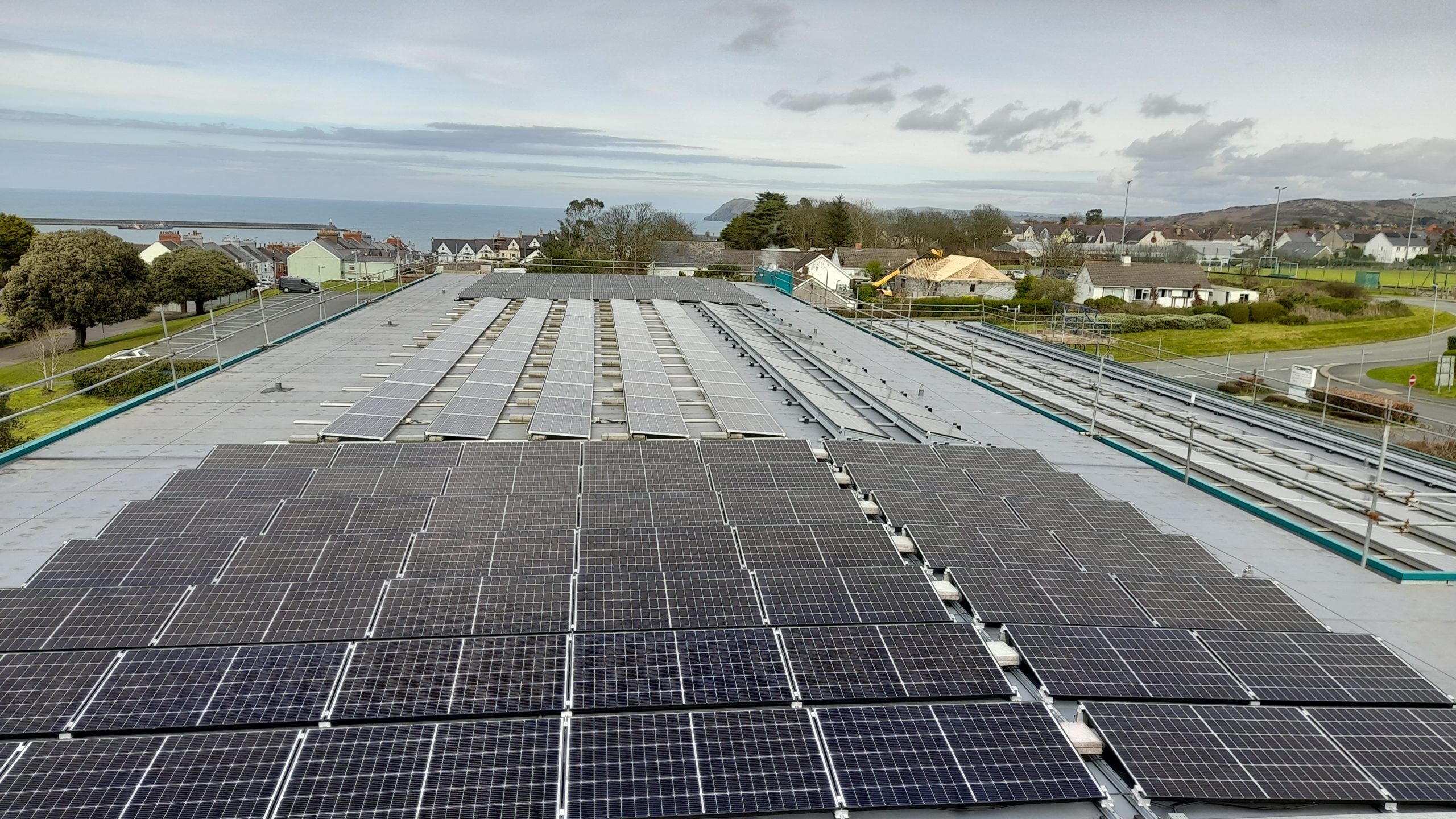
THE PARTNERSHIP between Pembrokeshire County Council and a community energy charity has recently helped two sites reduce costs and carbon emissions with solar panels.
During community energy fortnight, running until July 14th, the Green Pembrokeshire team is highlighting the second phase of work with Egni Co-op, a community energy organisation that installs rooftop Solar PV systems.
Egni cover the cost of installation and then sell the generated electricity to the building owner at a discount, with all profits generated used to fund further projects and environmental educational programmes.
In early 2023 Egni was awarded the contract to install systems on around 20 schools and leisure centres across the County and will manage and maintain the systems for 20 years.
It’s estimated that the solar panels will prevent the emission of approximately 200 tonnes of carbon dioxide per year and should save the schools and leisure centres £180,000 per year in energy costs.
This second phase has seen Fishguard Leisure Centre add a 170kW system to its existing 50kW provision and the energy will be sold to the building at a reduced rate. With the combined systems generating around 187,000 kWh a year, nearly 40 tonnes of CO2 will be offset.
During the first part of the month more than half the Centre’s electrical energy has been provided by the solar panels and daytime dependence on the grid is almost zero during the summer.
Also boosting its solar panel system is Tavernspite School where a 27kW system has been installed with discounted electricity reducing dependence on the electrical grid and offsetting approximately five tonnes of carbon emissions per year.
The school is one of many also benefiting from Egni’s education programme, alongside Sustainable Schools Pembrokeshire.
Egni Workshops challenge pupils to make the connection between energy and climate change, and school to reduce their energy through campaigning for behaviour change.
Cabinet Member for Place, the Region and Climate Change Cllr Paul Miller said: “These two sites are the latest to benefit from this innovative scheme that is helping the Council and its buildings make carbon savings, as well as saving money, without capital costs.”
Jenny Carlisle, Egni Development Manager, said: “We are delighted to be working with the Council and young people in Pembrokeshire schools. It’s a great example of co-operation. We all need to work together to tackle climate change and keep money in the Welsh economy.”
Climate
Marine Energy Boosts Welsh economy by £30m, Pembrokeshire leads
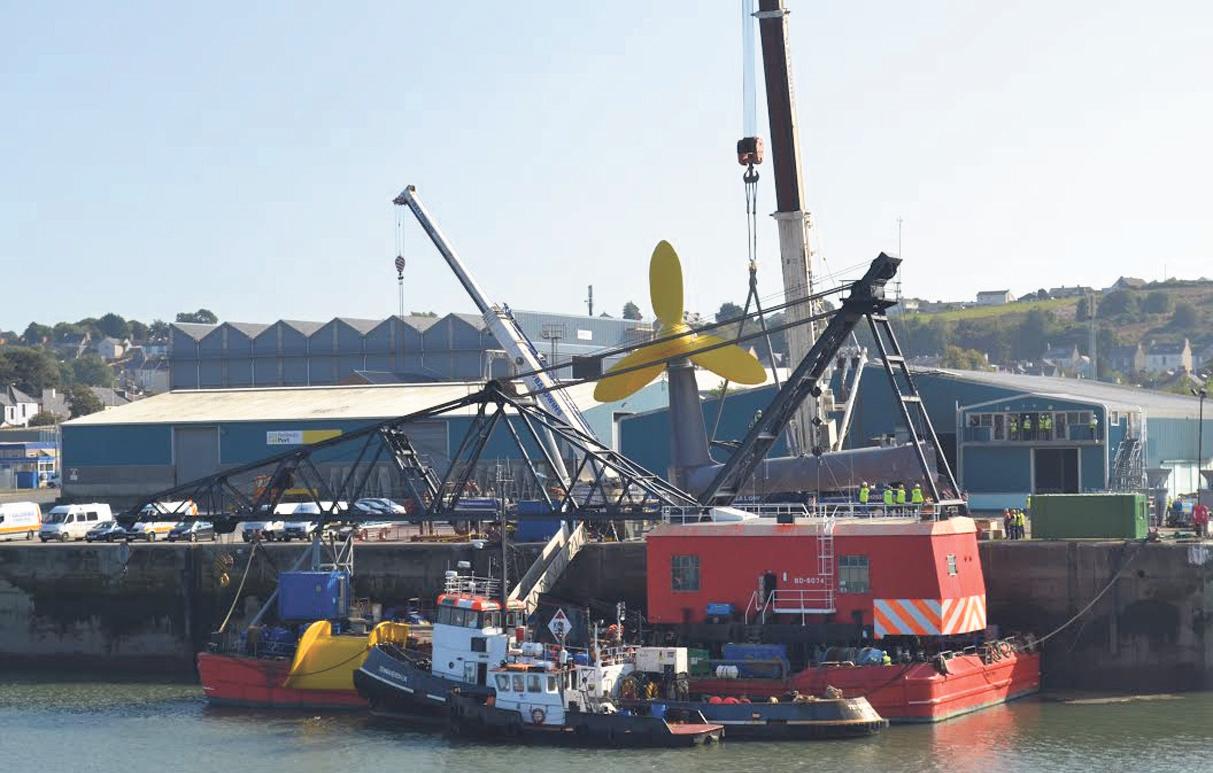
IN the 2023/24 financial year, Wales’ marine renewable energy sector delivered a substantial £29.9 million to the Welsh economy, as revealed in the latest State of the Sector Report by Marine Energy Wales. This brings the total cumulative spending and investment in the sector to an impressive £292.9 million.
Despite a notable reduction from the previous year’s £103.4 million, this year’s figure remains the second highest annual spend recorded to date. The decline is attributed to the conclusion of European grant funding and the completion of significant infrastructure projects, such as the Morlais development on Anglesey, which inflated last year’s expenditures.
Jeremy Miles, Cabinet Secretary for Economy, Energy and Welsh Language, expressed optimism about the sector’s future: “Wales is well placed to be at the forefront of marine energy technologies. Maximising this opportunity is an important step towards our path to net zero, attracting investment and creating highly skilled and well-paid jobs, particularly in coastal communities.”

The report highlights the considerable contribution of the tidal stream sector, which has injected £116.1 million into the Welsh economy since 2019, largely due to the Morlais infrastructure and the efforts of tidal kite developer Minesto.
Anglesey and Pembrokeshire are at the forefront of this growth, with Anglesey leading with £103.8 million in investments to date, closely followed by Pembrokeshire at £97 million. Swansea is also emerging as a key player, with £39.2 million invested in marine energy development.
The sector currently sustains 429 full-time jobs across Wales, with Pembrokeshire employing the highest number of people in the sector at 260 FTEs. This is due to the county’s established supply chain, which includes fabricators, engineers, and environmental consultants. Both Swansea and Anglesey also contribute significantly to employment in this sector.
Tam Bardell, Chair of Marine Energy Wales, underscored the importance of maintaining momentum: “We have just over a decade to meet the Welsh Government’s target of 100% renewable energy by 2035. While generating around 59% from renewable sources, we still have a long way to go. This report is not just a reflection of our achievements but a call to action.”
The future of the sector looks promising, particularly for tidal stream and floating offshore wind (FLOW), with a projected £486 million spend over the next five years in Wales. Continued support from governmental policies and increased private sector investment are essential for overcoming current barriers and ensuring Wales’ progression as a global leader in marine renewable energy generation.
As the sector grows, improving gender balance and diversifying roles remain positive steps forward, ensuring the industry’s sustainable development and its pivotal role in Wales’ economic and environmental future.
-

 Education5 days ago
Education5 days agoMilford Tesco worker achieves Oxford dream and lands top legal job
-

 Crime4 days ago
Crime4 days agoHaverfordwest man admits having nearly 1000 child and animal images
-

 Crime4 days ago
Crime4 days agoYouth set to appear in court over serious sexual offences
-

 Crime4 days ago
Crime4 days agoPolice investigating after man injured during altercation in cemetery
-

 Education4 days ago
Education4 days agoPupils delight in ice cream treat from Pembrokeshire’s number one van
-

 Crime4 days ago
Crime4 days agoTown centre ‘stinking of skunk’ as police strip cannabis farm
-

 Crime3 days ago
Crime3 days agoFag-butt police court summonses spark debate in Pembrokeshire
-

 News6 days ago
News6 days agoProposal to give firefighters a council tax discount to go to Cabinet











